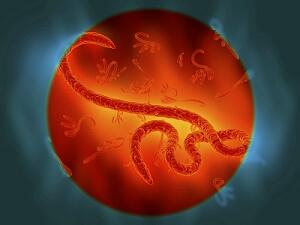
LSTM’s research fellow and lecturer, Dr Tom Fletcher, is senior author on a new paper published today in the journal, Lancet Infectious Diseases, based on an observational cohort study of patients with Ebola virus disease admitted to the Kerry Town Ebola treatment centre in Sierra Leone, during the current outbreak of the disease.
Ebola virus disease (EVD), previously known as Ebola haemorrhagic fever, is a severe, often fatal illness in humans. The virus is zoonotic, in that it is transmitted to people through wild animals, often through contaminated meat, and is spread through human-to-human contact. First recorded in 1976, the current outbreak in West Africa began in March 2014 and is estimated to have claimed the lives of over 11 thousand people to date (WHO).
The study, commissioned by the UK charity Save the Children, was designed to look at the clinical presentation, biochemical, and haematological parameters and their association with EVD. The finding are based on 150 patients who were admitted to the centre between 8 December 2014 and 9 January 2015, and had blood taken for Ebola confirmation and for haematological and biochemical analysis in order to study the association between these and the clinical outcome.
The average age of the patients recruited to the study was 26 years and the overall case fatality was 37%. Most patients were admitted with stage 2 or 3 of the disease and high levels of organ dysfunction and haematological abnormalities. The study found that kidney dysfunction was not restricted to late disease stages and supports the case for monitoring renal function and intravenous fluid treatment in early disease, even when dehydration is a less common clinical finding.
The study was also the first to record data for haematological abnormalities and suggests that mortality was associated with increased haemoglobin concentrations, potentially a marker for intravascular fluid depletion, widely believed to be associated with poor outcomes. The study also advocated that the most important aspects of supportive care was the aggressive management of intravascular volume depletion, the correction of electrolyte abnormalities and prevention of complications as a result of shock.
The authors are keen to promote the provision of routine laboratory support to an Ebola treatment centre. Dr Tom Fletcher said: “Ours is the largest and most complete study of EVD undertaken to date and as such we have been able to shed light on the organ dysfunction that is previously poorly understood. The provision of laboratory support needs to be standard in these settings to afford us the opportunity for improved understanding of disease pathogenesis and pathophysiology in humans. The knowledge gained along with better supportive care can help inform evidence based protocols to improve outcomes for this outbreak and the next.”
Read the abstract for the study here.